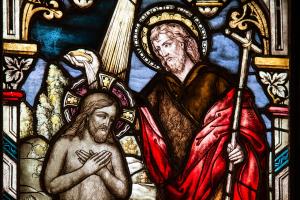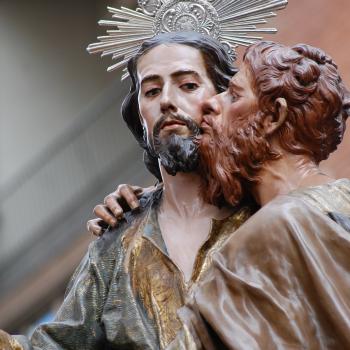Jesus claims that John the Baptist is Elijah who was to come in Matthew 11:13-14. But John himself denies that he is Elijah in John 1:21. So who is right? Can the two views be reconciled? Let’s examine these and other relevant biblical texts more closely.

The Synoptic Gospels on John the Baptist as Elijah
In the Synoptic Gospels John the Baptist is said to be Elijah. In Matthew 11:13–15, the text attributes to Jesus the following words: “for all the prophets and law prophesied until John. And if you will receive it, he is Elijah who is to come. The one who has ears, let him hear.” See also Matthew 17:10-13.
Mark 9:11–13 likewise has a similar saying as in Matt 11:13-15, though shorter and more implicit about John the Baptist as Elijah (cp. also Mark 6:15; 8:28). This is probably an older version, and Matthew’s rendition adds more interpretative information.
In Luke 1:17, Zechariah the priest finds out through an angel that he and his wife Elizabeth will have a son and they are to name him John. And “he will go before him in the spirit and power of Elijah” to turn the hearts of the fathers to their children. The latter thought clearly echoes the words of Malachi 4:5–6.
When Jesus claim that John is the Elijah to come, the prophetic text he seems to have in mind is the ending of Malachi 4:5–6 (Malachi 3:23–25 in the Hebrew and Greek texts). In this prophetic word, the Lord of hosts will send Elijah before the day of the Lord takes place. The purpose of his appearing will be for the people’s restoration including the turning of the hearts of fathers to their children and vice versa.
The Problem in John 1:21
In John 1:21, however, John the Baptist rejects this claim. The religious leaders send envoys to inquire about the identity of John, and one the questions they ask him is, “Are you Elijah?” To which he responds, “I am not.” The narrative may imply that others were making such claims about him.
Interpretations
Interpreters suggest various explanations for this:*
- One option is John did not tag that much significance onto himself as did Jesus.
- Another option is that John may have thought he was preparing the way for Elijah as Jesus at this time.
- Still, another possibility is that there is a genuine diversity of early traditions evident here. Along this line, a Johannine redactor may have later diminished the Baptist’s importance by having him deny his role as Elijah. The redactor’s motive might be against post-Easter followers of the Baptist who were still reluctant to now follow Jesus as risen Messiah (e.g., Acts 19:1–7).
A Better Explanation
Princeton Professor Dale Allison suggests, however, a more plausible option in my view: “That John thought of himself as one like Elijah is quite possible (see on [Matthew] 3:3–4). That he identified himself with Elijah seems doubtful (cf. Jn 1:21), But the equation may have been made by Jesus (see on [Matt] 17:9–13).”** This would seem to go along with the idea in Luke 1:17 that John would come in the spirit and power of Elijah without actually being Elijah.
Such a story as in Luke 1 about John’s infancy perhaps circulated early on among Christ followers. If so, then it is not likely that early Christ followers would have considered John to be the same man as Elijah who ascended to heaven in a whirlwind and never died (see 2 Kings 2).*** Otherwise, when Jesus met with Moses and Elijah when transfigured on the mount in Matt 17:1–8, might we not have expected it to be Moses and John the Baptist instead? Allison, who raises this question seems right to suggest that the Baptist simply holds “Elijah’s office, so that John came ‘in the spirit and power of Elijah’ (cf. Lk 1:17).” (Allison, Matthew 2:258-259).
Back to John 1:21
Hence, given this interpretation, all John the Baptist would be saying to his inquirers in John 1:19–28 would be that he is not literally Elijah. He is not that same man who went up to heaven and has now returned centuries later. Such a feat would be impossible for him, since John was born into the world as a baby about 30 years earlier.
If we assume that John already knew about his prophetic role and gifting that associated him with Elijah, then John was perhaps being portrayed as evasive here. He was not wanting to tell religious rivals more than they needed to know.
Notes
* See some of these options in D. A. Carson, The Gospel According to John (Pillar Commentary), 143.
** W. D. Davies and Dale C. Allison Jr., A Critical and Exegetical Commentary on the Gospel according to Saint Matthew (London: T&T Clark International, 2004), 2:258. Emphasis mine.
*** This view also resists reincarnation (or Pythagorean metempsychosis, according to Tertullian, De Anima 35). Elijah is still considered alive and his spirit is not his to give. In Luke 1:17 “spirit” is likely a gloss for character or attitude, if not a hendiadys: “spiritual power” of Elijah.

















